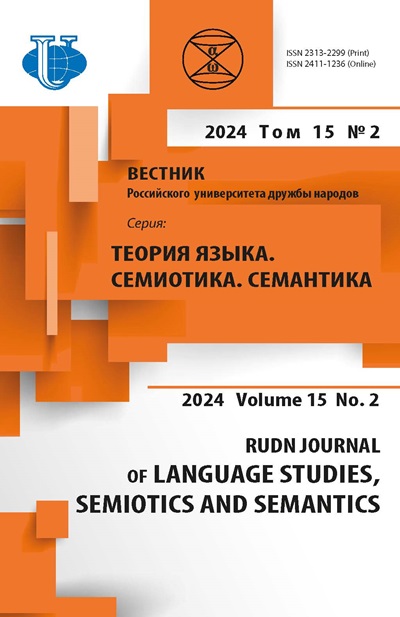АКТИВНЫЕ ПРОЦЕССЫ В СОВРЕМЕННОМ РУССКОМ ЯЗЫКЕ В СВЕТЕ ДЕТЕРМИНАНТНОГО АНАЛИЗА
- Авторы: Валентинова О.И.1, Рыбаков М.А.1
-
Учреждения:
- Российский университет дружбы народов
- Выпуск: Том 10, № 1 (2019)
- Страницы: 63-74
- Раздел: СИСТЕМНОСТЬ В НАУКЕ О ЯЗЫКЕ: ВНУТРЕННЯЯ И ВНЕШНЯЯ ДЕТЕРМИНАНТА ЯЗЫКОВЫХ КАТЕГОРИЙ И ЕДИНИЦ
- URL: https://journals.rudn.ru/semiotics-semantics/article/view/20890
- DOI: https://doi.org/10.22363/2313-2299-2019-10-1-63-74
Цитировать
Полный текст
Аннотация
Анализируя характер соотношения детерминанты языка определенного грамматического типа и наблюдаемых на всех уровнях языковой структуры явлений, авторы статьи обсуждают с позиций системной лингвистики такие характерные для современной массовой русской речи факты, которые традиционно рассматриваются с нормативно-дидактической точи зрения: нарушение падежного согласования, использование именительного падежа вместо косвенных, появление множественного числа у абстрактных существительных вне случаев формирования конкретных переносных значений, неразличение залогов, отсутствие соотнесенности субъекта деепричастного оборота с субъектом сказуемого, использование порядка слов, не соответствующего коммуникативной (темо-рематической) структуре высказывания, ошибочное употребление синонимов и др. Разработанный в рамках системной типологии метод детерминантного анализа языков позволил исследователям выявить уверенно закрепляющуюся в современной русской речи тенденцию к разрушению флективных связей между словами на формальном и содержательном уровнях, к росту аналитических способов построения высказывания, к развитию изоляции. Деформация флективности русского языка, вызванная ростом социальной и культурной неоднородности языкового коллектива, при сохранении таких параметров внешней детерминанты, определяющей именно флективный грамматический тип, как размер языкового коллектива и режим общения, не только затрудняет выражение сложных смыслов, но и делает их в конечном счете невостребованными в обществе, резко снижая преемственность при передаче социально значимого опыта. В центре внимания авторов находятся такие проблемы, как взаимодействие внешней и внутренней детерминант современного русского языка, степень соответствия типологического эталона флективных языков и характеристик грамматической системы русского языка, факторы изменения частотности грамматических форм, соответствие принятой литературной нормы типологическому идеалу, соответствие массовой речевой практики литературной норме. Теоретической основой статьи стала разработанная во второй половине ХХ века, но до сих пор не получившая широкой известности в языкознании системная теория профессора Геннадия Прокопьевича Мельникова, раскрывшая широкие возможности для синтеза частных языковедческих дисциплин и синтеза лингвистики, семиотики и информатики.
Об авторах
Ольга Ивановна Валентинова
Российский университет дружбы народов
Автор, ответственный за переписку.
Email: ovalentinova@yandex.ru
доктор филологических наук, профессор кафедры общего и русского языкознания Филологического факультета
ул. Миклухо-Маклая, 6, Москва, Россия, 117198Михаил Анатольевич Рыбаков
Российский университет дружбы народов
Email: rybakov_ma@pfur.ru
кандидат филологических наук, доцент кафедры общего и русского языкознания Филологического факультета
ул. Миклухо-Маклая, 6, Москва, Россия, 117198Список литературы
- Мельников Г.П. Язык как система и языковые универсалии // Языковые универсалии и лингвистическая типология. М.: Наука, 1969. С. 34-45.
- Валентинова О.И., Рыбаков М.А. Типологическая динамика языка как результат изменения ментальности его носителей // Язык и ментальность в диахронии. Владимир: Транзит-ИКС, 2017. С. 58-70.
- Humboldt W von. Über die Verschiedenheit des menschlichen Sprachbaues und ihren Einfluss auf die geistige Entwickelung des Menschengeschlechts. Berlin: Druckerei der Königlichen Akademie der Wissenschaften 1836.
- Мельников Г.П. Системная типология языков: Синтез морфологической классификации языков со стадиальной. М.: РУДН, 2000.
- Мельников Г.П. Системная типология языков: Принципы, методы, модели / отв. ред. Л.Г. Зубкова. М.: Наука, 2003.
- Мельников Г.П. Системология и языковые аспекты кибернетики. М.: Сов. Радио, 1978.
- Mel’nikov G.P. Systemology and linguistic aspects of cybernetics. Amsterdam, 1988.
- Danylenko A. The correlation of linguistic patterning and societal structures in systemic typology // Studia Linguistica Universitatis Iagellonicae Cracoviensis, 135 (2018). P. 81-96.
- Mieczkowska H. Formy zaniku fleksyjności w deklinacji słowackiej w konfrontacji z polszczyzną // Procesy innowacyjne w językach słowiańskich. Warszawa, 2003. P. 127-138.
- Мельников Г.П., Дремов А.Ф. Уровни связности текста, актуальная предикация и падеж с позиций системной лингвистики // Синтаксис и стилистика. М.: УДН, 1984. С. 49-70.
- Дремов А.Ф. Системная теория падежа и предлога в практике преподавания русского языка как иностранного. М.: Мир русского слова. 2001.
- Дремов А.Ф. Простое предложение и его значение // Языковая Системология. М.: РУДН, 2013. С. 56-64.
- Рыбаков М.А. Развитие представлений о типологическом сходстве языков: от многомерной классификации Э. Сепира до системной типологии Г.П. Мельникова // Валентинова О.И., Денисенко В.Н., Преображенский С.Ю., Рыбаков М.А. Системный взгляд как основа филологической мысли. М.: ЯСR. 2016. С. 17-136.
- Гзгзян Д.М. Функция предлога в составе семантической структуры высказывания: автореф. дисс.. канд. филол. наук. М., 1989.
- Miklosich F. Vergleichende Grammatik der slawischen Sprachen: Bd. Syntax. Wien: W. Braumüller, 1868-1874.
- Потебня А.А. Из записок по русской грамматике. Харьков: Д.Н. Полуехтов, 1888. Т. I.
- Овсянико-Куликовский Д.Н. Синтаксис русского языка. СПб.: Издание Д.Е. Жуковского, 1902.
- Пешковский А.М. Русский синтаксис в научном освещении. М.: Языки славянских культур, 2001.
- Бицилли П.М. Заметки о некоторых особенностях развития русского литературного языка // Бицилли П.М. Избранные труды по филологии. М.: Наследие, 1996. С. 249-340.
- Преображенский С.Ю. Системный анализ стиха // Валентинова О.И., Денисенко В.Н., Преображенский С.Ю., Рыбаков М.А. Системный взгляд как основа филологической мысли. М.: ЯСК. 2016. С. 303-376.
- Валентинова О.И. Системный подход к исследованию текста и стиля // Валентинова О.И., Денисенко В.Н., Преображенский С.Ю., Рыбаков М.А. Системный взгляд как основа филологической мысли. М.: ЯСК. 2016. С. 171-302.













